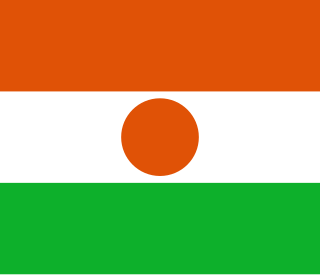Konni is a traditional Hausa state in what is today south central Maradi Region Niger and north Sokoto State Nigeria. It continues to exist as a ceremonial polity centered on the Nigerien city of Birni-N'Konni.

The Hausa are the largest ethnic group in Africa and the second largest language after Arabic in the Afroasiatic family of languages. The Hausa are a diverse but culturally homogeneous people based primarily in the Sahelian and the sparse savanna areas of southern Niger and northern Nigeria respectively, numbering over 70 million people with significant indegenized populations in Cameroon, Central African Republic, Republic of the Congo, Ivory Coast, Chad, Togo, Ghana, Sudan, Eritrea, Equatorial Guinea, Gabon, Senegal and the Gambia

The Region of Maradi is one of seven Regions of Niger. It is located in south-center Niger, east of the Region of Tahoua, west of Zinder, and north of Nigeria's city of Kano. The administrative center is at Maradi. The population of the Region is majority Hausa.

Niger or the Niger, officially the Republic of the Niger, is a landlocked country in West Africa named after the Niger River. Niger is bordered by Libya to the northeast, Chad to the east, Nigeria to the south, Benin to the southwest, Burkina Faso and Mali to the west, and Algeria to the northwest. Niger covers a land area of almost 1,270,000 km2 (490,000 sq mi), making it the largest country in West Africa. Over 80% of its land area lies in the Sahara Desert. The country's predominantly Islamic population of about 21 million live mostly in clusters in the far south and west of the country. The capital city is Niamey, located in Niger's southwest corner.
A small independent Hausa state in the medieval period, Konni was conquered by its larger neighbor Gobir around 1750. It remained, along with Gobir, a largely animist (locally called Azna) stronghold. It was overrun and sacked by forces of the Sokoto Caliphate at the beginning of the 19th century, but had reverted to suzerainty of Azna states in modern Niger when French colonial forces entered the area at the end of the century. Its capital Birni-N'Konni (Hausa for Citadel of Konni), was sacked by the French Voulet-Chanoine Mission in the 1898, and later assimilated into French West Africa. The traditional title of the ruler of Konni was retained by the French as an appointed "Canton chief", and continues as a ceremonial ruler.
Gobir was a city-state in what is now Nigeria. Founded by the Hausa in the eleventh century, Gobir was one of the seven original kingdoms of Hausaland, and continued under Hausa rule for nearly seven hundred years. Its capital was the city of Alkalawa. In the early 19th century elements of the ruling dynasty fled north to what is today Niger from which a rival dynasty developed ruling as Sarkin Gobir at Tibiri. In 1975 a reunited traditional sultanate took up residence in Sabon Birni, Nigeria

The Sokoto Caliphate was an independent Islamic Sunni Caliphate, in West Africa. Founded during the jihad of the Fulani War in 1804 by Usman dan Fodio, it was abolished when the British defeated the caliphate in 1903 and put the area under the Northern Nigeria Protectorate.

The French colonial empire constituted the overseas colonies, protectorates and mandate territories that came under French rule from the 16th century onward. A distinction is generally made between the "first colonial empire," that existed until 1814, by which time most of it had been lost, and the "second colonial empire", which began with the conquest of Algiers in 1830. The second colonial empire came to an end after the loss in later wars of Indochina (1954) and Algeria (1962), and relatively peaceful decolonizations elsewhere after 1960.









